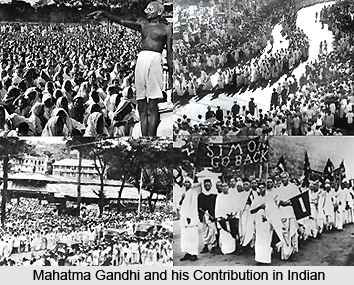 After the second world war when Labour party came to the power after the general elections in Britain in 1945, promised an early realization of self Government in India. The future shape of a free and united India was about to discussed. But the Mission from Englad and India leaders failed to bring the Congress and Muslims together. Gandhi advised the Congress to reject the proposals the British Cabinet Mission offered in 1946, as he was deeply suspicious of the grouping proposed for Muslim-majority states - Gandhi viewed this as a precursor to partition. Congress broke from Gandhi, as Nehru and Patel knew that if they did not agree with the plan, the British will pass the control of government to the Muslim League.
After the second world war when Labour party came to the power after the general elections in Britain in 1945, promised an early realization of self Government in India. The future shape of a free and united India was about to discussed. But the Mission from Englad and India leaders failed to bring the Congress and Muslims together. Gandhi advised the Congress to reject the proposals the British Cabinet Mission offered in 1946, as he was deeply suspicious of the grouping proposed for Muslim-majority states - Gandhi viewed this as a precursor to partition. Congress broke from Gandhi, as Nehru and Patel knew that if they did not agree with the plan, the British will pass the control of government to the Muslim League.
An overwhelming majority of Muslims living in India, side by side with Hindus and Sikhs, were in favour of Partition. The partition plan was approved by the Congress leadership as the only way to prevent a wide-scale Hindu-Muslim civil war. Congress leaders knew that Gandhi would oppose partition, and it was impossible for the Congress to go ahead without his agreement, for Gandhi`s support in the party and throughout India was strong. Gandhi`s closest colleagues had accepted partition as the best way out, and Sardar Patel endeavoured to convince Gandhi that it was the only way to avoid civil war. Overwhelmed Gandhi gave his assent.
Gandhi did not celebrate independence with the rest of India. He was alone in Calcutta and working to end the violence. After the independence he focused on Hindu-Muslim peace and unity. Despite the Indo-Pakistani War of 1947, he was troubled when the Government decided to deny Pakistan the Rs. 55 crores due as per agreements made by the Partition Council. Gandhi feared that instability and insecurity in Pakistan would increase their anger against India, and violence would spread across the borders. He further feared that Hindus and Muslims would renew their enmity and precipitate into an open civil war.
On January 30, 1948, while Gandhiji having his nightly public walk on the grounds of the Birla Bhavan (Birla House) in New Delhi, was shot and killed. His last word was `Hey Ram`. The assassin, Nathuram Godse, was a Hindu radical with links to the extremist Hindu Mahasabha. He held Gandhi responsible for weakening India by insisting upon a payment to Pakistan. Godse and his co-conspirator Narayan Apte were later tried and convicted; they were executed on 15 November 1949. Gandhi`s memorial at Raj Ghat, New Delhi, bears the epigraph, which may be translated as "Oh God". According to his wish, the majority of Gandhi`s ashes were immersed in some of the world`s major rivers, such as The Nile, Volga, Thames, etc.




















